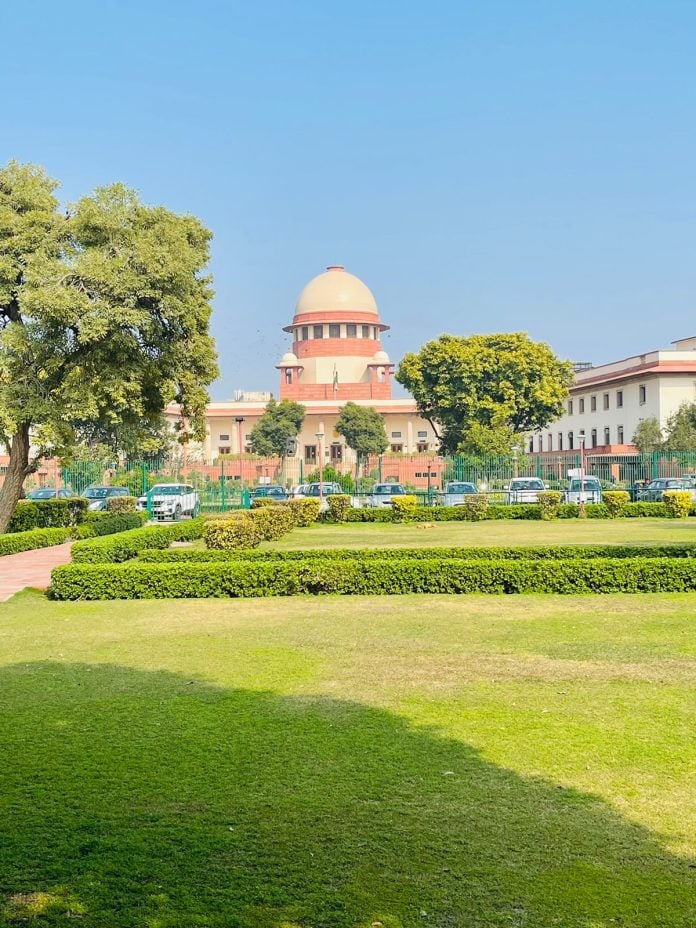The Supreme Court has dismissed a petition, challenging the Gujarat High Court order against the petitioner, convicted for killing his wife.
A Bench of Justice L. Nageswara Rao and Justice B.R. Gavai upheld the Gujarat High Court order, wherein the High Court dismissed the appeal filed by petitioner against his conviction C.R. No. I4 of 2008 for the offences punishable under Section 302 and 201, IPC for murdering his wife by Additional Sessions Judge, Patan in Sessions Case No 26 of 2008.
Deceased Rekhaben was married to petitioner Vanzara Ramaji Panaji. On the night of February 20, 2008 the deceased and the petitioner had a quarrel over some issue during which the petitioner got enraged and killed the deceased Rekhaben by strangulating her with the shawl.
A complaint was lodged in Kakoshi Police Station vide C.R.No.I 4 of 2008 for the offences punishable U/S 302 and 201, IPC
Ranaji Joitaji Vanzara, stated that Deceased – Rekhaben was his daughter and she had made a telephone call on the mobile phone of her brother one day before the incident where she had spoken to her mother , about the threats she was getting from her mother in law. She also mentioned that she suspected that they were planning to kill or harm her.
Also Read: Delhi High Court disposes of plea against illegal construction in Delhi’s Vikaspuri
On that very day, at about 11:30 pm, PW No.5 – Amraji Khemaji had telephonically informed him from the brick kiln that a fierce quarrel is going on between the deceased and the petitioner and his daughter may get killed. When this witness reached brick kiln along with other members, it was learnt that the dead body of the deceased was taken to Khedbrahma and therefore, he has lodged the complaint before Kakoshi Police Station.
Dr Arjunsinh Kalusinh Charan, who is a doctor, stated that the evidence suggest that the death was due to strangulations. The post mortem note also does not reveal any external marks of injury, but shows that deceased died due to strangulation, which certifies the claim.
Moreover, it appears from the panchnama of recovery of shawl, Exhibit 15 which was used by the petitioner for strangulating his wife – Rekhaben was recovered at the instance of the petitioner.
Although both the panchas have turned hostile, the Investigating Officer, Kalpesh Vadilal Rajgor (PW No.9) in paragraph 2 has specifically stated that the shawl was recovered at the instance of the petitioner from the room.
Also Read: Delhi High Court defers Delhi Judicial Services Examination till April 7
It was contended by the petitioner before the High Court that there was no eye witness to the incident and that story of phone calls said to have been made by Rekha to her brother and also by Amraji Khemaji (PW 5) to the complainant are fabricated.
The High Court relied on judgement passed by the Supreme Court in Narendra vs State of Karnataka, (2009) 6 SCC 61, Trimukh Maroti Kirkan Vs. State of Maharashtra (2006) 10 SCC 681 & Jagdish Vs. State of Madhya Pradesh, (2009) 9 SCC 495, wherein it was held that circumstances, when they are so evidently categoric, constitute a chain even stronger than an eyewitness account, and reminds of the cliche’ that men often lie, circumstances do not.
The High Court, considering the ocular evidence as well as the medical evidence, observed that it is a clear case of culpable homicide and upheld the Trial Court order.
The Apex Court refused to interfere in the judgement passed by the High Court and dismissed the petition.


